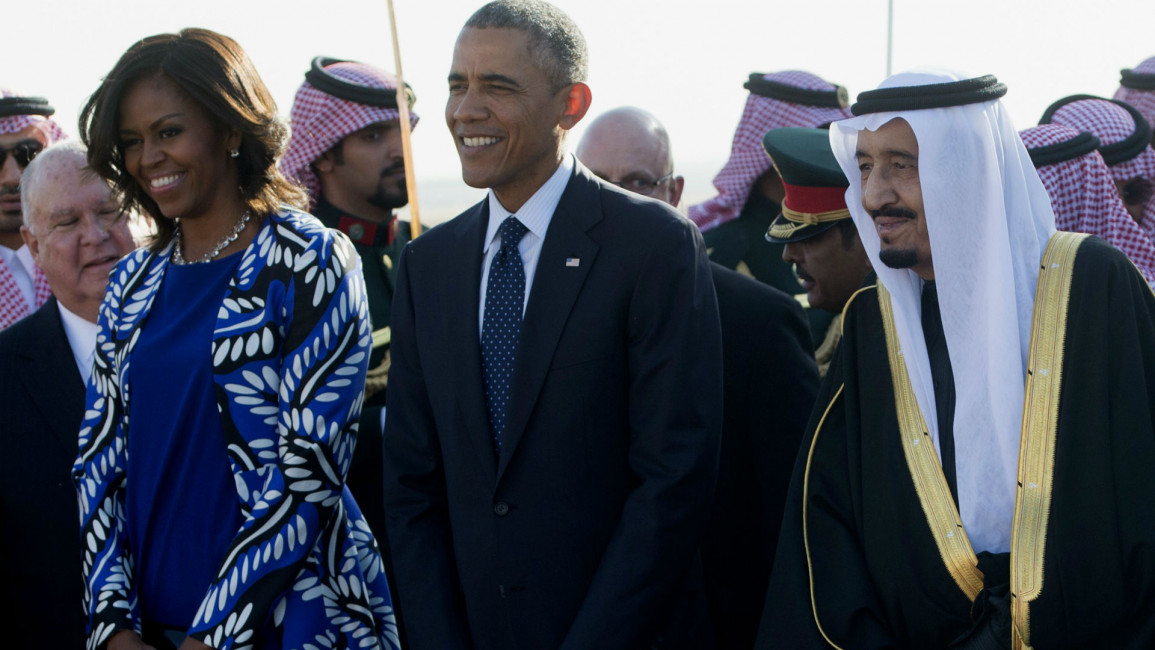Obama arrives in Riyadh, defends US - Saudi ties
President Barack Obama landed in Saudi Arabia on Tuesday to shore up ties with new King Salman and offer condolences after the death of his predecessor Abdullah.
Obama leads a bipartisan delegation of lawmakers, senior U.S. officials and two former secretaries of state to Saudi Arabia Tuesday to pay respects to the royal family following King Abdullah's death.
Ahead of his touchdown in Saudi Arabia, President Barack Obama defended the US government's willingness to cooperate closely with the Kingdom on national security despite deep concerns over human rights.
Saudi Arabia's status as one of Washington's most important Arab allies has at times appeared to trump US concerns about the terrorist funding that flows from the kingdom and about human rights abuses.
But Obama said he has found it most effective to apply steady pressure over human rights "even as we are getting business done that needs to get done."
"Sometimes we need to balance our need to speak to them about human rights issues with immediate concerns we have in terms of counterterrorism or dealing with regional stability," Obama said in a CNN interview that aired in advance of his arrival.
King Salman bin Abdul-Aziz Al Saud formally greeted Obama and the U.S. delegation at the Erga Palace on the outskirts of Riyadh for their first formal meeting without making any comments to reporters.
High level delegation
Secretary of State John Kerry was joining Obama in Riyadh, along with former Secretaries of State Condoleezza Rice and James Baker, both of whom served Republican presidents. Former White House national security advisers Brent Scowcroft, Sandy Berger and Stephen Hadley were also making the trip, as was Sen. John McCain.
Several lawmakers who traveled with Obama to India, including House Minority Leader Nancy Pelosi, were also joining him in Saudi Arabia.
Yet Obama's presidency also has been marked by strain with the royal family.
Abdullah, the 90-year-old monarch who died Friday, had pressed the U.S. to take more aggressive action to force Syrian President Bashar Assad from office. The royal family is also deeply sceptical of Obama's diplomacy with Iran.
White House officials said these issues were among those likely to come up during the president's discussions with the king and other Saudi officials.
"It will be a chance for us to make sure that we're in good alignment going forward where we have overlapping interests," said Ben Rhodes, Obama's deputy national security adviser.
Saudi Arabia's new king is a veteran of the country's top leadership, versed in diplomacy from nearly 50 years as the governor of the capital Riyadh and known as a mediator of disputes within the sprawling royal family.
Salman, 79, had increasingly taken on the duties of the king over the past year as his ailing predecessor and half-brother, Abdullah, became more incapacitated. He takes the throne at a challenging time for the kingdom, as oil prices tumble and the US and Saudi-backed government in Yemen implodes.
In his initial days on the throne, Salman has given little indication that he plans to bring fundamental changes to his country's policies. In a nationally televised address shortly after his half brother's death, Salman vowed to hew to "the correct policies which Saudi Arabia has followed since its establishment."
Obama had originally planned to send Vice President Joe Biden to lead the U.S. delegation to Saudi Arabia. But when White House officials realized that Biden's arrival in Riyadh would coincide with Obama's departure from India, they opted to send the president instead.



